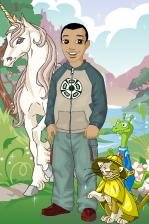 This is an alternate history on a parallel earth type of story. But those aspects are mere garnishings, as is common in such stories. Main story is a juvenile adventure of a young man from New York city in a parallel Arab world where djinns actually exist as distinct species. Story could very well have done without parallel world bit, the way Ted Chiang often manages.
This is an alternate history on a parallel earth type of story. But those aspects are mere garnishings, as is common in such stories. Main story is a juvenile adventure of a young man from New York city in a parallel Arab world where djinns actually exist as distinct species. Story could very well have done without parallel world bit, the way Ted Chiang often manages.
There are occasional ethnically sensitive sentences that might rub the wrong way depending on where you live in the world. Thankfully, there aren't too many of them, & I found them easy to ignore.
On entertainment front, I'll call it "not bad". Nowhere in the top league where you cannot put the book down. Nor one where you wish you hadn't picked it up.
Story summary.
Barkut is a walled city state on the earth in a parallel universe. It's located in roughly the region where Arabian states live in our world.
Tony Gregg, a young man from New York, is washed ashore a few miles from the city - in the tradition of magical island stories. He has been seeking this place as a trader - monopoly trade between an alternate world & New York ought to be profitable.
He will instead find himself in a world of adventures where humans & djinns exist in a warring state. His boasting about US nuclear bombing of Hiroshima to impress the slave girl Ghail (who has been teaching him local language) will lead to his getting appointed the general of city's army that is expected to vanquish the djinn empire!!!
To add to complications, a "djinnee" (female djinn) Nasim has fallen in love with him while she was spying in Barkut!
His talk of US nuclear bomb will also get djinn king worried. He gets invited to djinn capital, & lavishly entertained. But he senses an assassination plot. His desperate & hopeless actions will succeed beyond expectations, & he will find himself appointed King of Djinns!!
Also there is human queen in captivity in djinn-land who needs freeing!
Of course, by the end he will be the "King of Djinns and Men", having married the ...
Story describes djinns in loving detail, even occasionally attempting hand-wavy descriptions of their physical nature.
- Djinns are made from a matter fundamentally different from matter we are made from. And each djinn is equivalent of a full-scale atom bomb (we will see some blasts near end)!
- While they are shape shifters, total mass of a djinn doesn't change during these metamorphoses. So a djinn in the shape of a bug is far denser than in the shape of a camel.
- While physically very powerful, psychologically djinns are like human children or apes.
- All djinns have a basic biological allergy to a plant called "lasf". This will the main human weapon in war against djinns.
- ... there is a lot else I don't recall.
On parallel universe bit.
May be 10% of the story is devoted to this part. Given two parallel earths, they share some part of earth's surface. If you are in these common parts, you can normally move to either one! This
gateway aspect is both similar to & different from his much better known story, "Sidewise in Time".
Someone wanders to parallel earth via such a gateway. A search is mounted for him. This search changes the universe's probabilities in ways that that place is no longer shared between the two earths! So, over the eons, these gateways have been shrinking - though there are still some. In this story, an Arab city bordering Mediterranean called Suakim will serve as gateway.
To ensure there is not too much mingling of parallel worlds, "matter" from each world has something distinct that makes it feel attracted to its own world - something akin to gravitation!
In fact, Tony's adventure began in New York when he found a "ten-dirhim" gold coin from Barkut. Inquiries revealed no known place now or in history where the coin could have come from. Because coin
wants to go
home, it will become his luck charm & eventually motivate him to travel to the parallel earth where coin is happy!!
Collected in.
- Murray Leinster's "A Logic Named Joe" (collection), ed Eric Flint.
Fact sheet.
First published:
Startling magazine, January 1952 as "Journey to Barkut" [via
Wikipedia].
Download full text from Webscription.
Rating: B
Related:
All stories of Murray Leinster.














 This is the first published story of Myers.
This is the first published story of Myers. I've only read the online stories from this collection - 3 of the 5. Nowhere near the best of van Vogt, but readable. My
I've only read the online stories from this collection - 3 of the 5. Nowhere near the best of van Vogt, but readable. My  Whole book is available as JPEG page scans online, but as part of a larger package.
Whole book is available as JPEG page scans online, but as part of a larger package.  This is an
This is an 